University Presentation: Embracing Sustainability in Food Production
VerifiedAdded on 2023/04/22
|10
|1145
|485
Presentation
AI Summary
This presentation explores the critical need for embracing sustainable agriculture in food production. It argues that sustainable practices are essential for meeting current needs without compromising future generations' ability to meet their own. The presentation defines sustainability in food production, encompassing environmental, social, and economic dimensions. It examines the characteristics of sustainable food systems, including economic viability, biodiversity preservation, and the impact of organic farming on employment, health, water, soil, and greenhouse gas emissions. The presentation includes a visual essay plan and references various studies to support the arguments. It concludes by emphasizing the increasing importance of sustainable food production and the role of organic farming in achieving it.
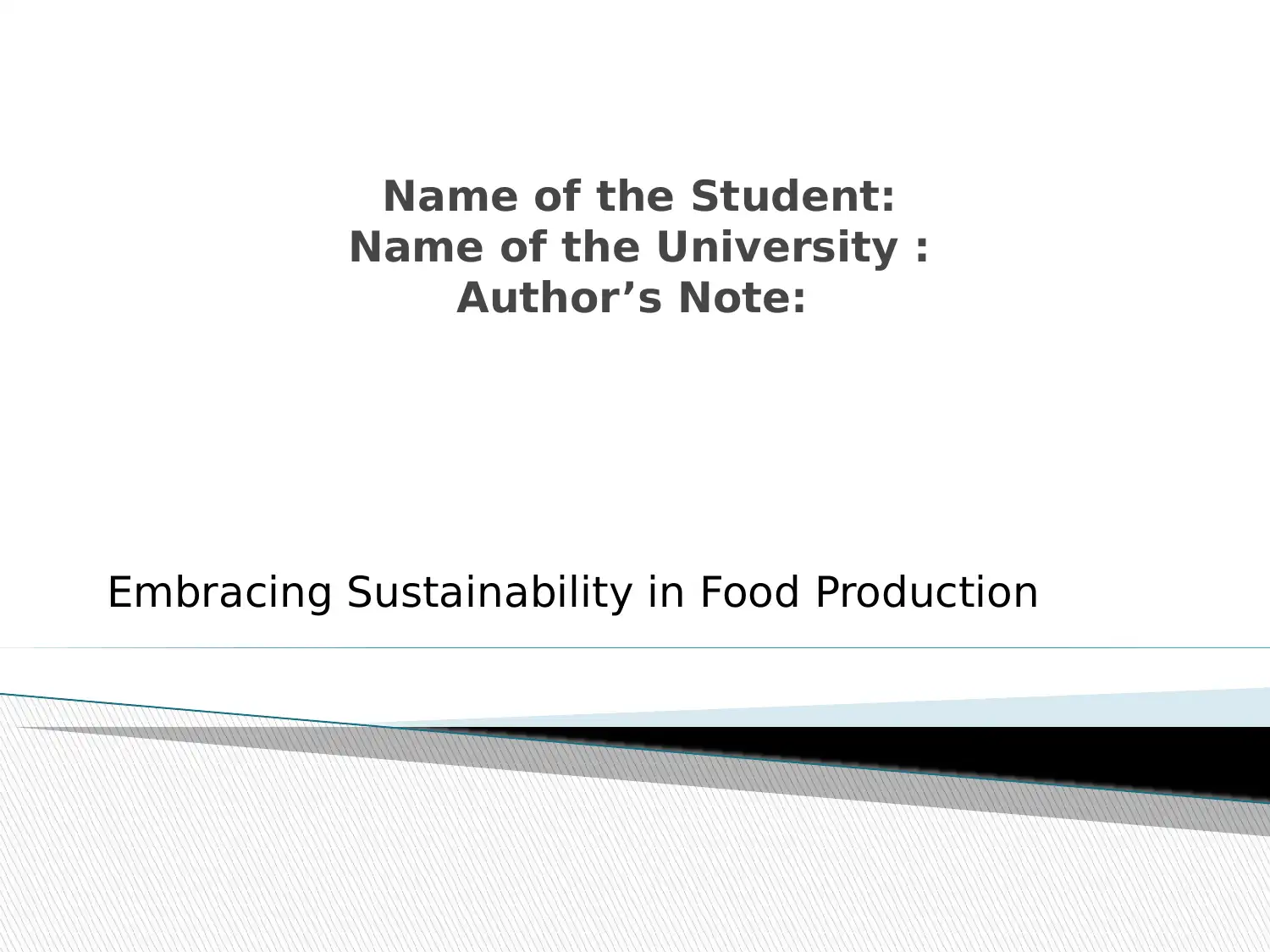
Name of the Student:
Name of the University :
Author’s Note:
Embracing Sustainability in Food Production
Name of the University :
Author’s Note:
Embracing Sustainability in Food Production
Paraphrase This Document
Need a fresh take? Get an instant paraphrase of this document with our AI Paraphraser
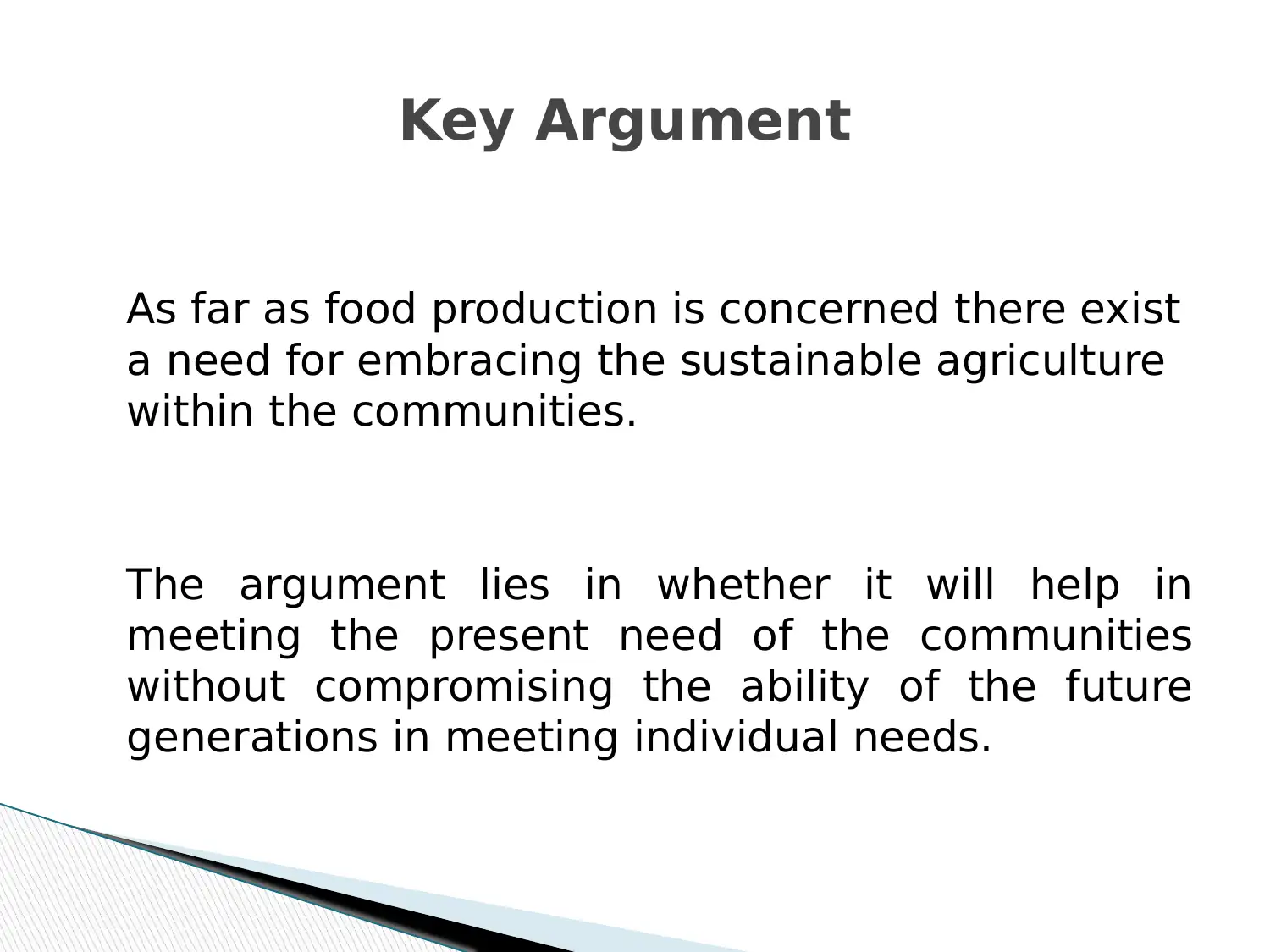
As far as food production is concerned there exist
a need for embracing the sustainable agriculture
within the communities.
The argument lies in whether it will help in
meeting the present need of the communities
without compromising the ability of the future
generations in meeting individual needs.
Key Argument
a need for embracing the sustainable agriculture
within the communities.
The argument lies in whether it will help in
meeting the present need of the communities
without compromising the ability of the future
generations in meeting individual needs.
Key Argument
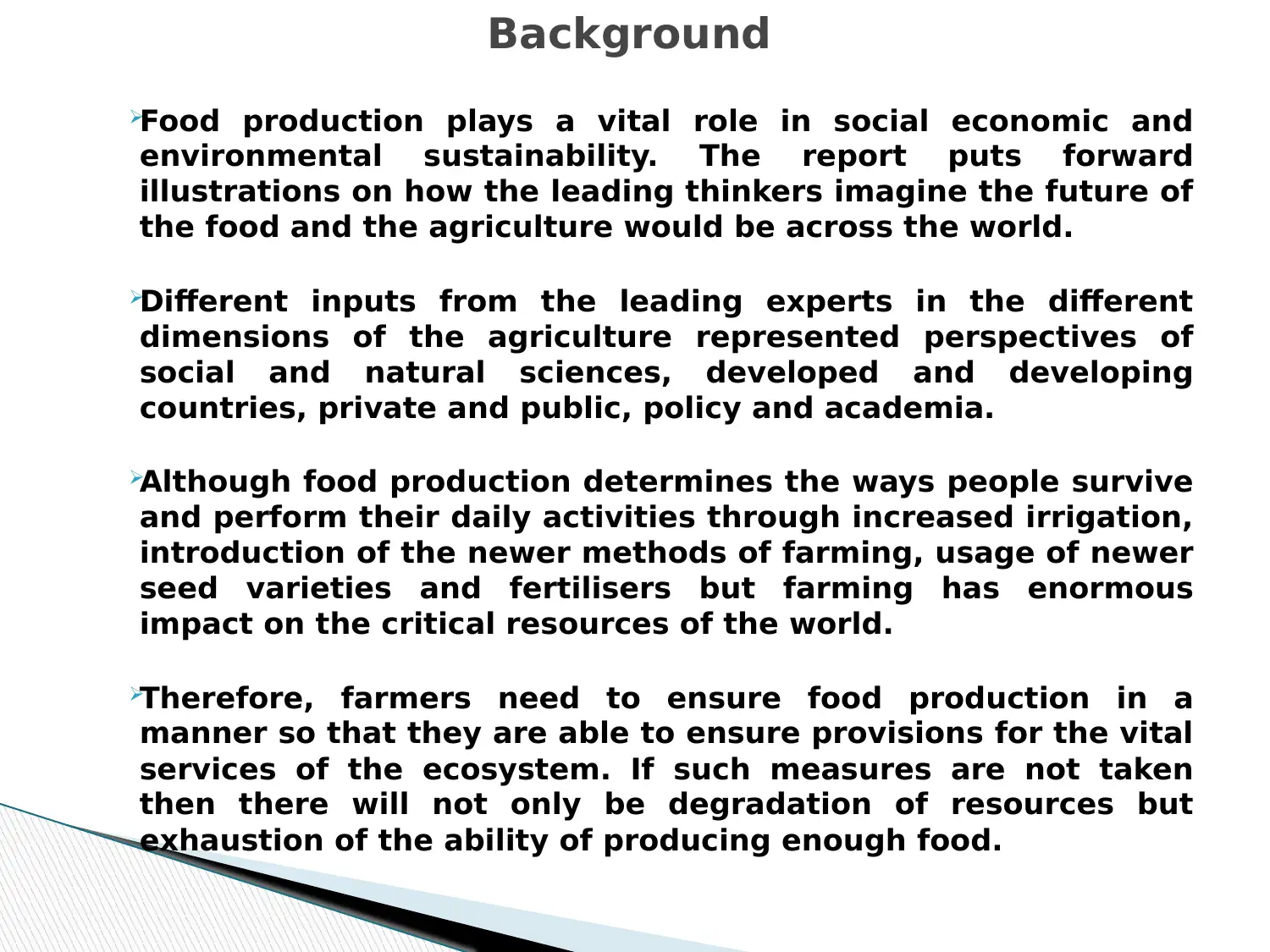
Food production plays a vital role in social economic and
environmental sustainability. The report puts forward
illustrations on how the leading thinkers imagine the future of
the food and the agriculture would be across the world.
Different inputs from the leading experts in the different
dimensions of the agriculture represented perspectives of
social and natural sciences, developed and developing
countries, private and public, policy and academia.
Although food production determines the ways people survive
and perform their daily activities through increased irrigation,
introduction of the newer methods of farming, usage of newer
seed varieties and fertilisers but farming has enormous
impact on the critical resources of the world.
Therefore, farmers need to ensure food production in a
manner so that they are able to ensure provisions for the vital
services of the ecosystem. If such measures are not taken
then there will not only be degradation of resources but
exhaustion of the ability of producing enough food.
Background
environmental sustainability. The report puts forward
illustrations on how the leading thinkers imagine the future of
the food and the agriculture would be across the world.
Different inputs from the leading experts in the different
dimensions of the agriculture represented perspectives of
social and natural sciences, developed and developing
countries, private and public, policy and academia.
Although food production determines the ways people survive
and perform their daily activities through increased irrigation,
introduction of the newer methods of farming, usage of newer
seed varieties and fertilisers but farming has enormous
impact on the critical resources of the world.
Therefore, farmers need to ensure food production in a
manner so that they are able to ensure provisions for the vital
services of the ecosystem. If such measures are not taken
then there will not only be degradation of resources but
exhaustion of the ability of producing enough food.
Background
⊘ This is a preview!⊘
Do you want full access?
Subscribe today to unlock all pages.

Trusted by 1+ million students worldwide
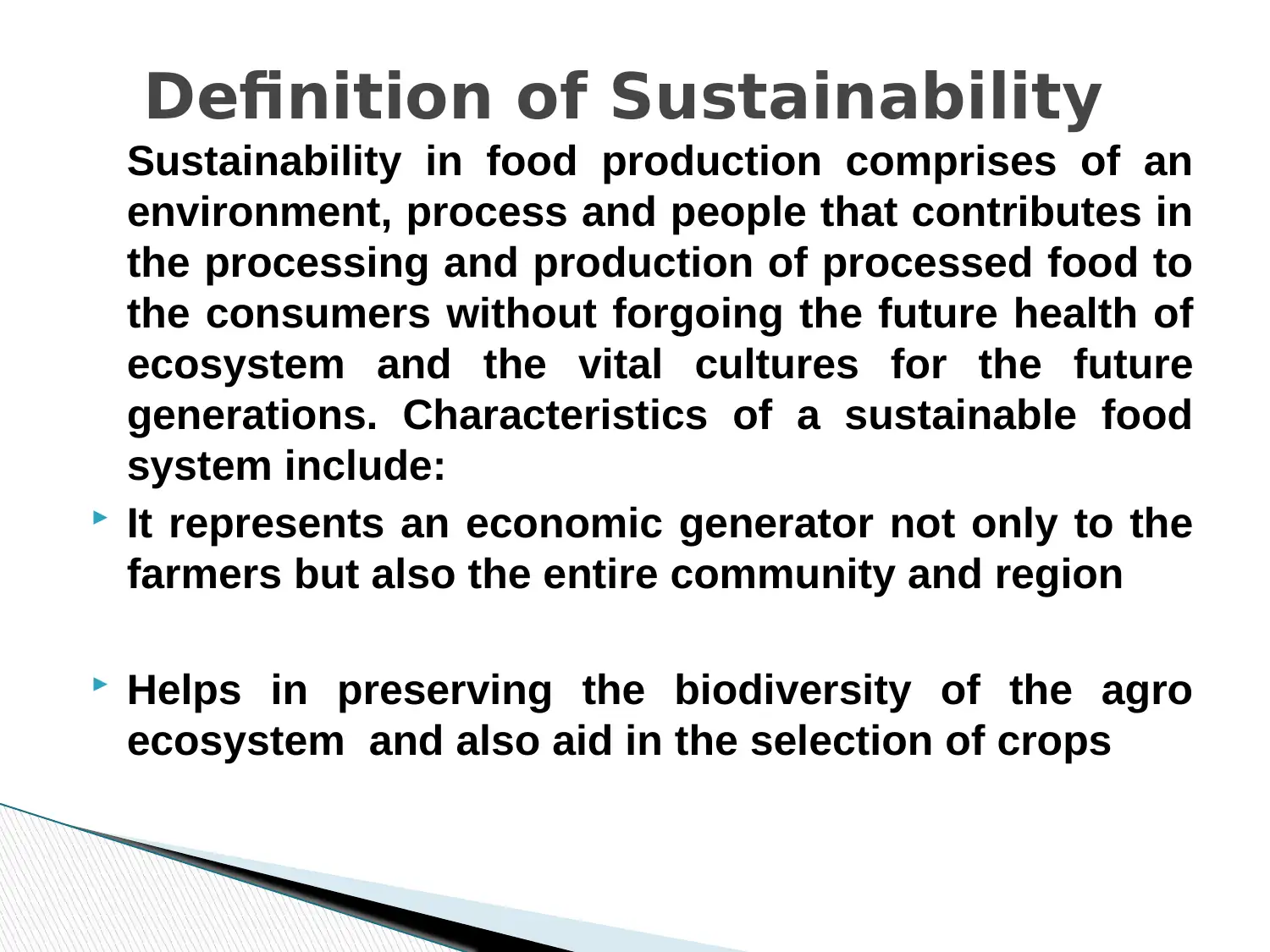
Sustainability in food production comprises of an
environment, process and people that contributes in
the processing and production of processed food to
the consumers without forgoing the future health of
ecosystem and the vital cultures for the future
generations. Characteristics of a sustainable food
system include:
It represents an economic generator not only to the
farmers but also the entire community and region
Helps in preserving the biodiversity of the agro
ecosystem and also aid in the selection of crops
Definition of Sustainability
environment, process and people that contributes in
the processing and production of processed food to
the consumers without forgoing the future health of
ecosystem and the vital cultures for the future
generations. Characteristics of a sustainable food
system include:
It represents an economic generator not only to the
farmers but also the entire community and region
Helps in preserving the biodiversity of the agro
ecosystem and also aid in the selection of crops
Definition of Sustainability
Paraphrase This Document
Need a fresh take? Get an instant paraphrase of this document with our AI Paraphraser
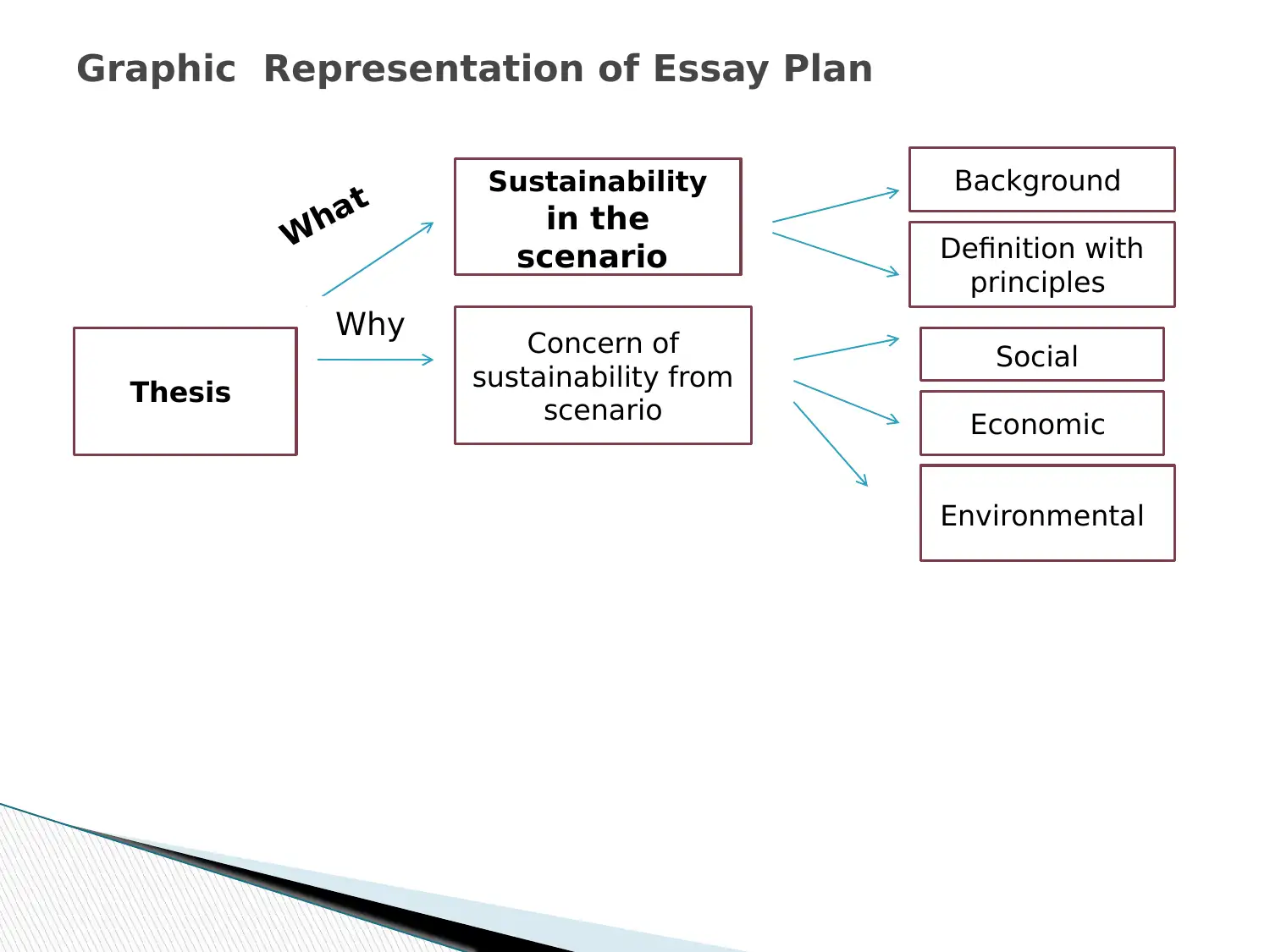
Graphic Representation of Essay Plan
Thesis
Sustainability
in the
scenario
Concern of
sustainability from
scenario
Background
Definition with
principles
Social
Economic
Environmental
What
Why
Thesis
Sustainability
in the
scenario
Concern of
sustainability from
scenario
Background
Definition with
principles
Social
Economic
Environmental
What
Why
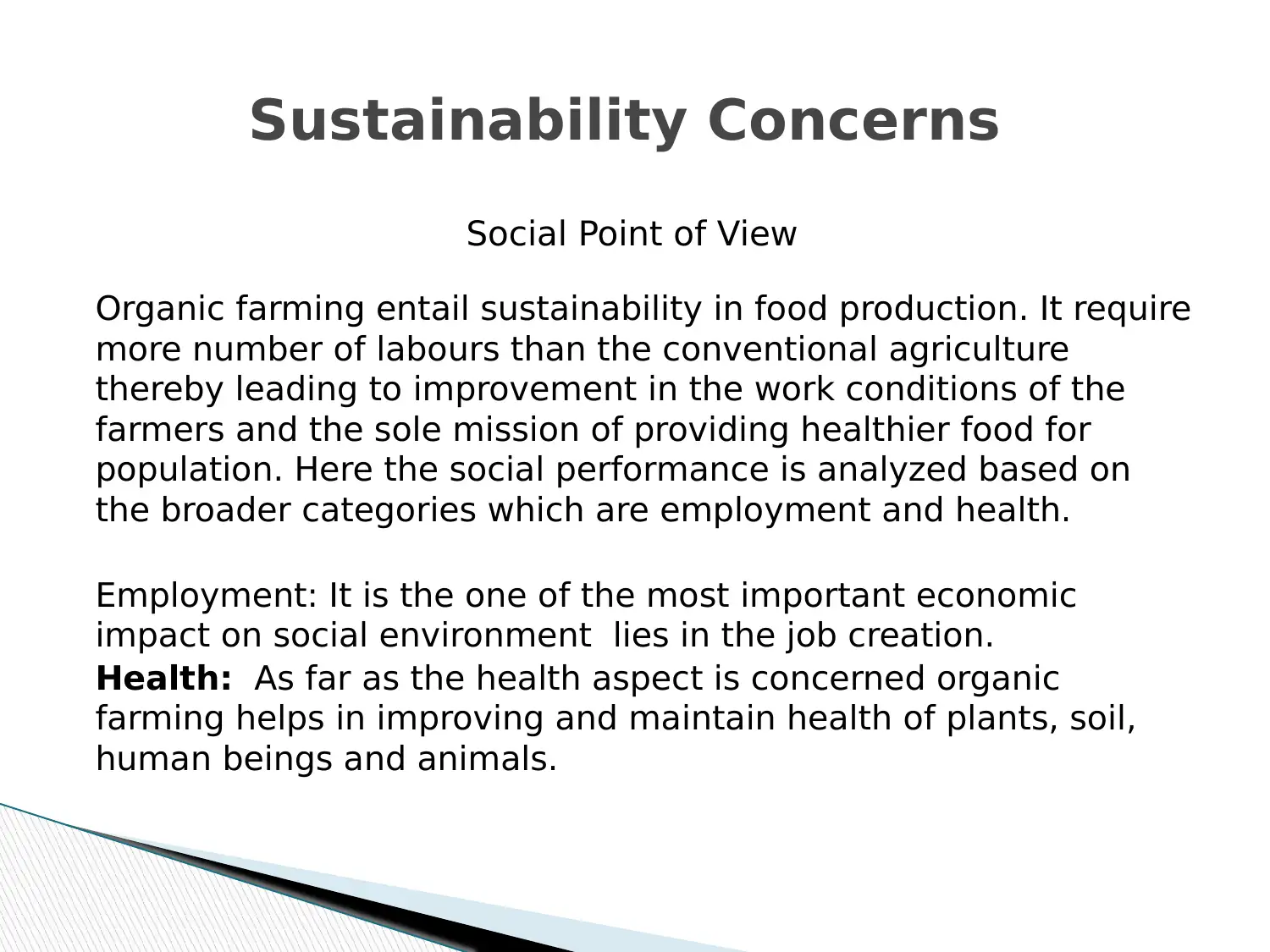
Social Point of View
Organic farming entail sustainability in food production. It require
more number of labours than the conventional agriculture
thereby leading to improvement in the work conditions of the
farmers and the sole mission of providing healthier food for
population. Here the social performance is analyzed based on
the broader categories which are employment and health.
Employment: It is the one of the most important economic
impact on social environment lies in the job creation.
Health: As far as the health aspect is concerned organic
farming helps in improving and maintain health of plants, soil,
human beings and animals.
Sustainability Concerns
Organic farming entail sustainability in food production. It require
more number of labours than the conventional agriculture
thereby leading to improvement in the work conditions of the
farmers and the sole mission of providing healthier food for
population. Here the social performance is analyzed based on
the broader categories which are employment and health.
Employment: It is the one of the most important economic
impact on social environment lies in the job creation.
Health: As far as the health aspect is concerned organic
farming helps in improving and maintain health of plants, soil,
human beings and animals.
Sustainability Concerns
⊘ This is a preview!⊘
Do you want full access?
Subscribe today to unlock all pages.

Trusted by 1+ million students worldwide
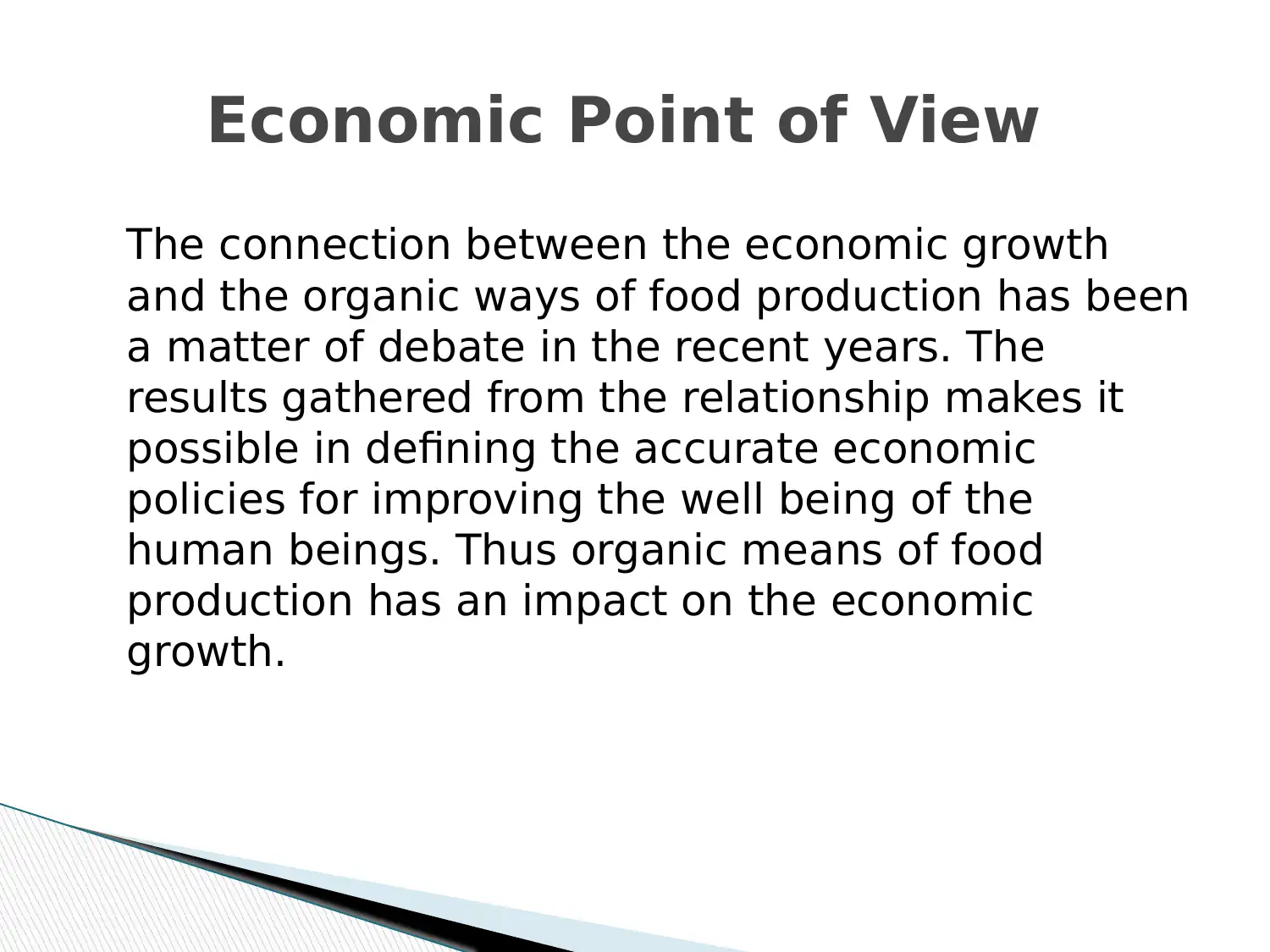
The connection between the economic growth
and the organic ways of food production has been
a matter of debate in the recent years. The
results gathered from the relationship makes it
possible in defining the accurate economic
policies for improving the well being of the
human beings. Thus organic means of food
production has an impact on the economic
growth.
Economic Point of View
and the organic ways of food production has been
a matter of debate in the recent years. The
results gathered from the relationship makes it
possible in defining the accurate economic
policies for improving the well being of the
human beings. Thus organic means of food
production has an impact on the economic
growth.
Economic Point of View
Paraphrase This Document
Need a fresh take? Get an instant paraphrase of this document with our AI Paraphraser
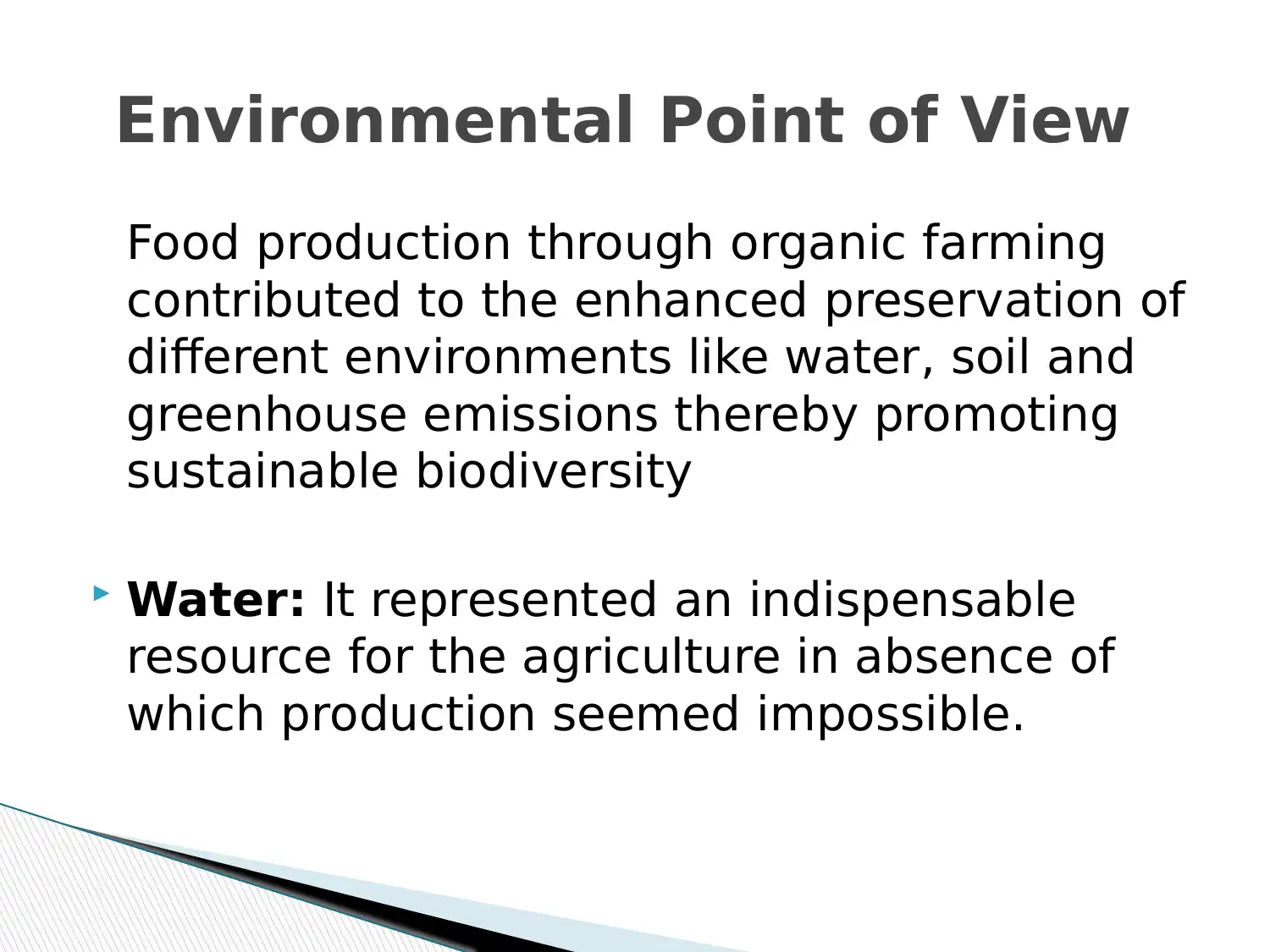
Food production through organic farming
contributed to the enhanced preservation of
different environments like water, soil and
greenhouse emissions thereby promoting
sustainable biodiversity
Water: It represented an indispensable
resource for the agriculture in absence of
which production seemed impossible.
Environmental Point of View
contributed to the enhanced preservation of
different environments like water, soil and
greenhouse emissions thereby promoting
sustainable biodiversity
Water: It represented an indispensable
resource for the agriculture in absence of
which production seemed impossible.
Environmental Point of View
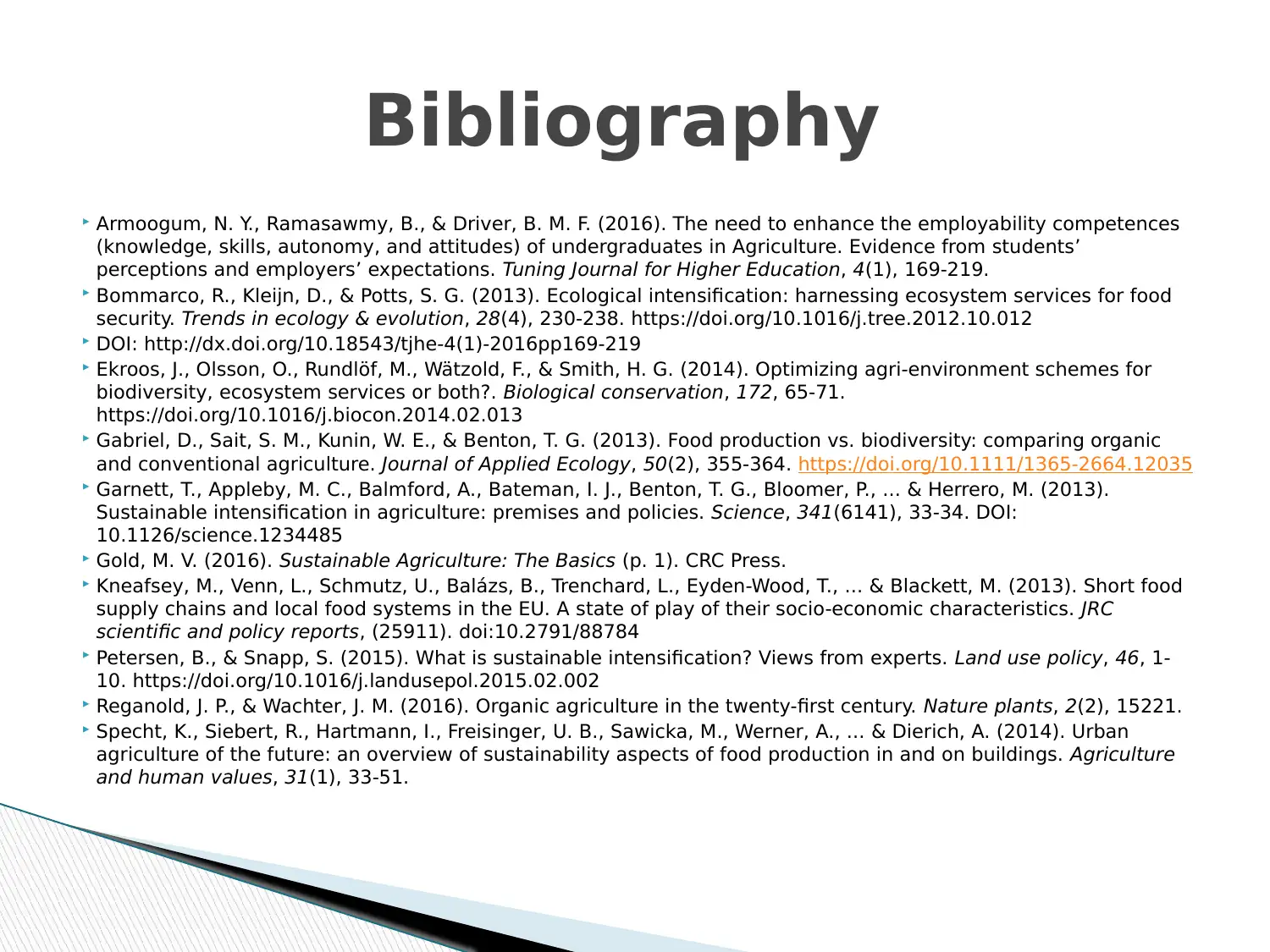
Armoogum, N. Y., Ramasawmy, B., & Driver, B. M. F. (2016). The need to enhance the employability competences
(knowledge, skills, autonomy, and attitudes) of undergraduates in Agriculture. Evidence from students’
perceptions and employers’ expectations. Tuning Journal for Higher Education, 4(1), 169-219.
Bommarco, R., Kleijn, D., & Potts, S. G. (2013). Ecological intensification: harnessing ecosystem services for food
security. Trends in ecology & evolution, 28(4), 230-238. https://doi.org/10.1016/j.tree.2012.10.012
DOI: http://dx.doi.org/10.18543/tjhe-4(1)-2016pp169-219
Ekroos, J., Olsson, O., Rundlöf, M., Wätzold, F., & Smith, H. G. (2014). Optimizing agri-environment schemes for
biodiversity, ecosystem services or both?. Biological conservation, 172, 65-71.
https://doi.org/10.1016/j.biocon.2014.02.013
Gabriel, D., Sait, S. M., Kunin, W. E., & Benton, T. G. (2013). Food production vs. biodiversity: comparing organic
and conventional agriculture. Journal of Applied Ecology, 50(2), 355-364. https://doi.org/10.1111/1365-2664.12035
Garnett, T., Appleby, M. C., Balmford, A., Bateman, I. J., Benton, T. G., Bloomer, P., ... & Herrero, M. (2013).
Sustainable intensification in agriculture: premises and policies. Science, 341(6141), 33-34. DOI:
10.1126/science.1234485
Gold, M. V. (2016). Sustainable Agriculture: The Basics (p. 1). CRC Press.
Kneafsey, M., Venn, L., Schmutz, U., Balázs, B., Trenchard, L., Eyden-Wood, T., ... & Blackett, M. (2013). Short food
supply chains and local food systems in the EU. A state of play of their socio-economic characteristics. JRC
scientific and policy reports, (25911). doi:10.2791/88784
Petersen, B., & Snapp, S. (2015). What is sustainable intensification? Views from experts. Land use policy, 46, 1-
10. https://doi.org/10.1016/j.landusepol.2015.02.002
Reganold, J. P., & Wachter, J. M. (2016). Organic agriculture in the twenty-first century. Nature plants, 2(2), 15221.
Specht, K., Siebert, R., Hartmann, I., Freisinger, U. B., Sawicka, M., Werner, A., ... & Dierich, A. (2014). Urban
agriculture of the future: an overview of sustainability aspects of food production in and on buildings. Agriculture
and human values, 31(1), 33-51.
Bibliography
(knowledge, skills, autonomy, and attitudes) of undergraduates in Agriculture. Evidence from students’
perceptions and employers’ expectations. Tuning Journal for Higher Education, 4(1), 169-219.
Bommarco, R., Kleijn, D., & Potts, S. G. (2013). Ecological intensification: harnessing ecosystem services for food
security. Trends in ecology & evolution, 28(4), 230-238. https://doi.org/10.1016/j.tree.2012.10.012
DOI: http://dx.doi.org/10.18543/tjhe-4(1)-2016pp169-219
Ekroos, J., Olsson, O., Rundlöf, M., Wätzold, F., & Smith, H. G. (2014). Optimizing agri-environment schemes for
biodiversity, ecosystem services or both?. Biological conservation, 172, 65-71.
https://doi.org/10.1016/j.biocon.2014.02.013
Gabriel, D., Sait, S. M., Kunin, W. E., & Benton, T. G. (2013). Food production vs. biodiversity: comparing organic
and conventional agriculture. Journal of Applied Ecology, 50(2), 355-364. https://doi.org/10.1111/1365-2664.12035
Garnett, T., Appleby, M. C., Balmford, A., Bateman, I. J., Benton, T. G., Bloomer, P., ... & Herrero, M. (2013).
Sustainable intensification in agriculture: premises and policies. Science, 341(6141), 33-34. DOI:
10.1126/science.1234485
Gold, M. V. (2016). Sustainable Agriculture: The Basics (p. 1). CRC Press.
Kneafsey, M., Venn, L., Schmutz, U., Balázs, B., Trenchard, L., Eyden-Wood, T., ... & Blackett, M. (2013). Short food
supply chains and local food systems in the EU. A state of play of their socio-economic characteristics. JRC
scientific and policy reports, (25911). doi:10.2791/88784
Petersen, B., & Snapp, S. (2015). What is sustainable intensification? Views from experts. Land use policy, 46, 1-
10. https://doi.org/10.1016/j.landusepol.2015.02.002
Reganold, J. P., & Wachter, J. M. (2016). Organic agriculture in the twenty-first century. Nature plants, 2(2), 15221.
Specht, K., Siebert, R., Hartmann, I., Freisinger, U. B., Sawicka, M., Werner, A., ... & Dierich, A. (2014). Urban
agriculture of the future: an overview of sustainability aspects of food production in and on buildings. Agriculture
and human values, 31(1), 33-51.
Bibliography
⊘ This is a preview!⊘
Do you want full access?
Subscribe today to unlock all pages.

Trusted by 1+ million students worldwide
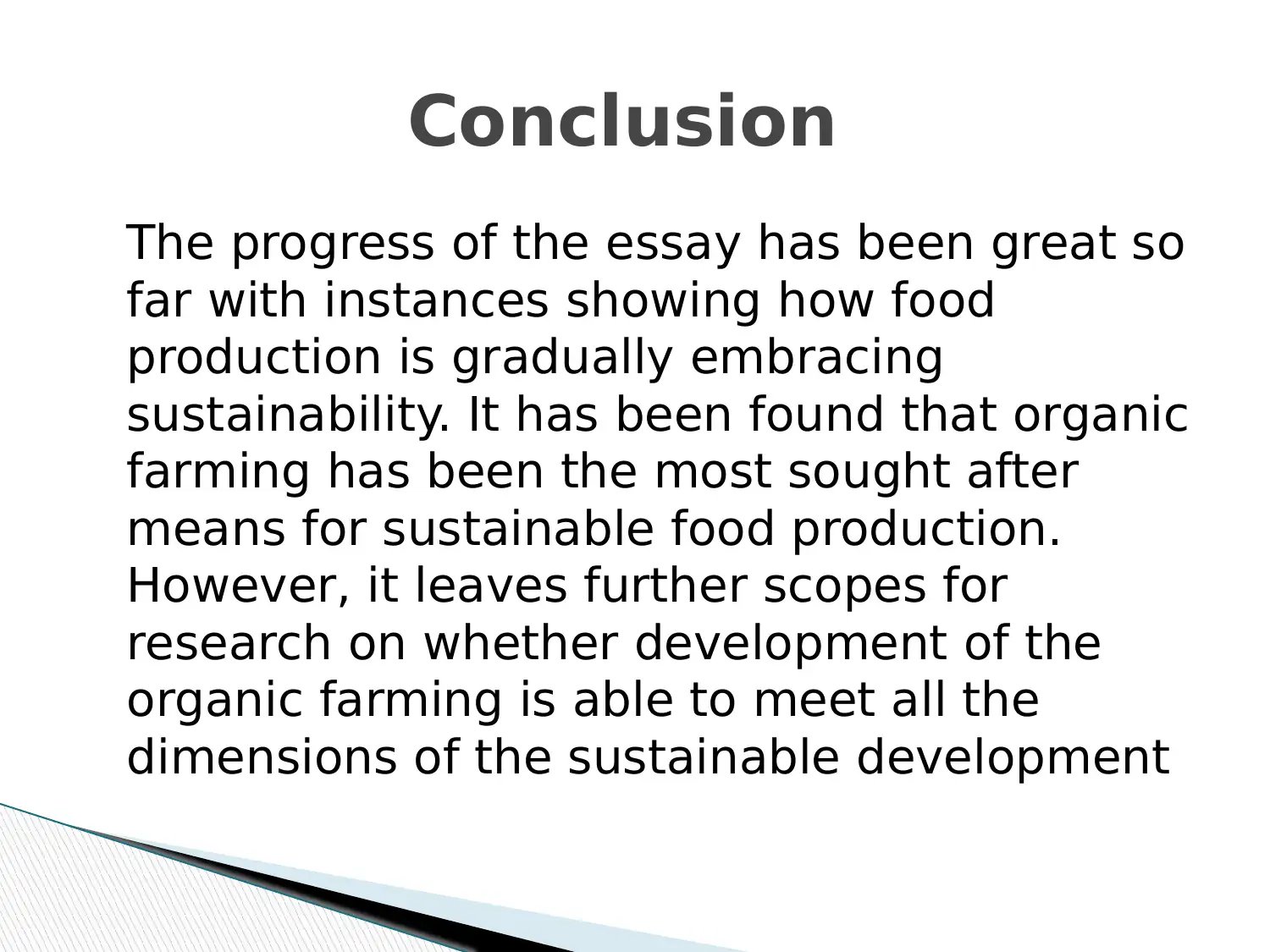
The progress of the essay has been great so
far with instances showing how food
production is gradually embracing
sustainability. It has been found that organic
farming has been the most sought after
means for sustainable food production.
However, it leaves further scopes for
research on whether development of the
organic farming is able to meet all the
dimensions of the sustainable development
Conclusion
far with instances showing how food
production is gradually embracing
sustainability. It has been found that organic
farming has been the most sought after
means for sustainable food production.
However, it leaves further scopes for
research on whether development of the
organic farming is able to meet all the
dimensions of the sustainable development
Conclusion
1 out of 10
Related Documents
Your All-in-One AI-Powered Toolkit for Academic Success.
+13062052269
info@desklib.com
Available 24*7 on WhatsApp / Email
![[object Object]](/_next/static/media/star-bottom.7253800d.svg)
Unlock your academic potential
Copyright © 2020–2026 A2Z Services. All Rights Reserved. Developed and managed by ZUCOL.





